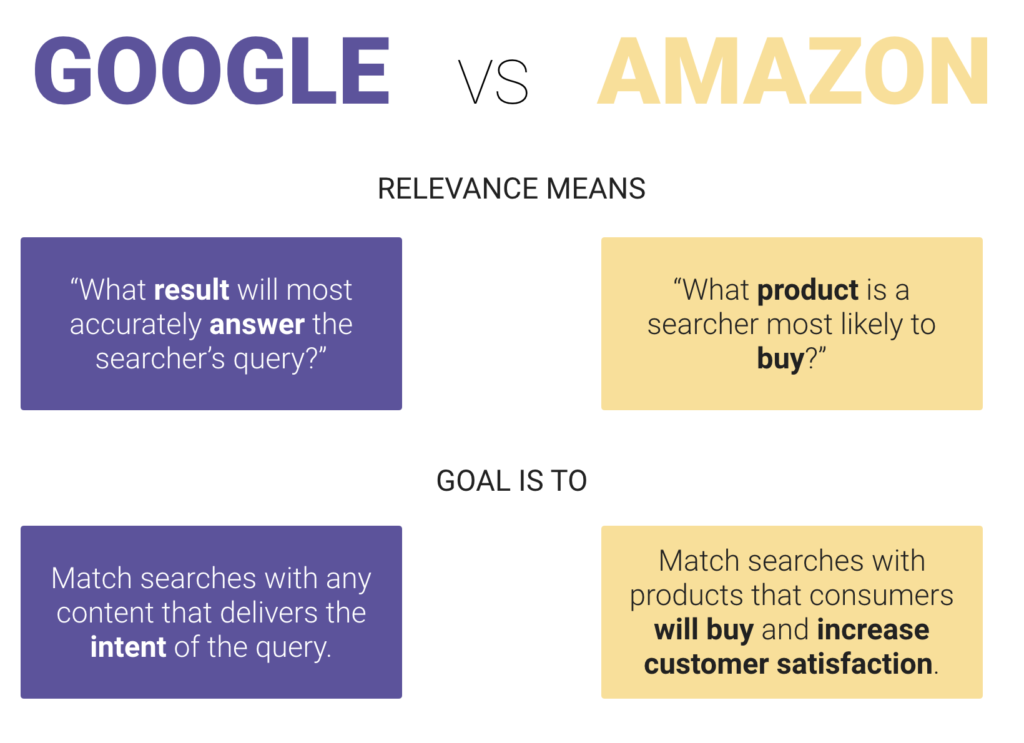For many years now, Google has dominated the world of search marketing. However, over the past several years, we are seeing Google face more and more competition in the search space. The topic of alternative search engines is growing in relevance for many marketers, and continues to come up in conversations of platform choice. When we talk about alternative search engines, what do we mean? How do they impact your marketing strategy and overall findability?
What are alternative search engines?
Alternative search engines are things like Amazon, YouTube, Pinterest, and other platforms that have their own algorithms for determining what content to serve their audience. The issue is, it’s also your audience.
The rise of platforms that determine how to serve up content that you’re creating to audiences based on a variety of factors makes findability an even bigger challenge for brands, products, and services. Let’s look at each of our example search engines a bit to discuss.
Amazon
Amazon is now the default place that many people go to for not just purchasing but product reviews as well. This is a HUGE shift in how shopping takes place for consumers and for marketers. Amazon’s A9 algorithm serves up products by considering a variety of factors. Marketers who are focused on getting to those top placements for their products are focused on things like user reviews, product descriptions, image quality, and more. 
What is still important? Understanding what keywords a consumer will user when they’re looking for the product. That means we need Amazon search intelligence to know how we should craft our product pages within the Amazon marketplace, and which keywords to include in our descriptions and information sections. This is now a niche market for many. Because of the huge increase in interest, it is something we’ve developed a platform product to address. We are starting to see a noticeable increase in Amazon specific agencies and tools.
YouTube
Amazon isn’t the only place where alternative search engines are used. YouTube is another platform that serves up its content differently than a traditional search engine does. It uses its own algorithm to determine what type of video content to serve you and what to play next. This has been in the news a lot lately for extreme issue like politics, and how that may or may not impact someone’s ability to make choices.
A less extreme topic is something like product choices when researching a purchase. If we go on YouTube and are looking for specific product information, the types of videos YouTube recommends with your search will likely impact any future product purchasing decisions. Beyond ads and influencer content, YouTube’s search results play a big role in marketing for brands.
Pintrest
Another platform that serves as an alternative search engine is Pinterest. Pinterest is huge for things like home consumer goods, health, beauty, fashion, DIY projects, and all the products associated with these verticals. The way Pinterest figures out how to serve content to you is based on many different factors. Understanding how Pinterest is making these decisions is useful for marketers for when they are creating content for their products.
This also brings up the use of hashtags. When we look at how people are finding different content, many marketers are piling lots of hashtags hoping one will work. One of the things we’re starting to look at as an industry is whether or not these alternative search engines and the associated algorithms are only pulling things from specific hash tags. 
Let’s say you’re doing a DIY project, and you’re trying to remodel your bathroom. You want to do a black and white tile floor. If you search for “black and white tile floor” or “bathroom tile floor.” Is Pinterest only showing you results that contain information for your search term, or is it looking deeper than that? As a marketer, we need to be sure that all our various products can be found by the intended audience.
Understanding more through experimentation
Because search platforms do not reveal how they make their decisions on what to show, many marketers resort to experiments to figure out what works and what doesn’t. One of the ways this has been done in the past is to create a fake page and add a non-sensical keyword to the page. Then you can also add it to things like title tags, H1 tags, and H2 tags, and see how adding and removing the keyword from these various elements impacts results. This can be done with similar things like hashtags and image tags.
When we look at video content specifically, one of the things that is interesting is that the title and description we put on the tags is important. Also important are the words that are being used to describe the video in the comments. Transcription is another factor that can come into play. Is the algorithm understanding what the content of the video is about based on the transcription? As marketers, we need to be able to understand how all of these factors are impacting search.
Cross channel impacts
One of the topics we address a lot is, how do we know how much impact marketing on one channel will have on findability on another channel. Sometimes these impacts are very transparent, especially with things like paid search. What we don’t get much insight on is for how this interaction between channels is impacted with organic.
We are also seeing the lines blur between desktop and mobile, and now voice. We have previously discussed some of this shift with things like Google transitioning to Mobile First and Speed Updates. How are these alternative search engines changing their algorithms with this in mind? Will these algorithms serve up different content if you are searching in a store versus if I’m not? How do these factors change change results, and how can we as marketers, adjust our strategies accordingly?
One of the things that seems to still ring true, is that fundamentals still really matter. Research how these platforms work is critical. Do you know how someone would find your product on Amazon? On Pinterest? On YouTube? If you don’t know the answer to this, you don’t know how to optimize and improve your results. It is still important to optimize all content, whether it’s text, images, or video, for findability. Optimization strategies will likely vary across these different platforms. However, covering the basics is the most important aspect of this and will pay off down the line as this content is cross-promoted on different platforms.
Gaining useful insights
One tool that has been around for a long time that is still very useful is small focus groups. Finding some consumers of your products and asking them how they found your product can be quite helpful. Understanding how your customers found your products may surprise you and will enable you to optimize outside of your competitors.
When we talk about trends, we have also seen the long-tail searches that are continuing to expand with the onset of voice search, are impacting the length of actual queries. Did your customers find you via voice search? If so, knowing this will help you optimize your site.
Competitor research is another exercise that can be very helpful. Understanding what else shows up when certain search queries are entered provides a lot of insight. What else do your competitors provide? Who are their typical audience members? How can you use these insights to optimize your site so you remain on top? Understanding all these factors will help you keep an edge on your competition.
Impact of universal search elements
When discussing Google, we often talk about universal search elements. These include things like the answer box, knowledge panel, shopping results, and video. We consider these elements rank position zero. They appear above any organic results. These universal search elements often keep searchers on the SERP, and we find fewer searchers navigating off the SERP to your content.
With alternative search engines, we do not see this same behavior where the SERP has become the destination. When users are on Instagram or Pinterest, for example, searchers are directly seeing your content and interacting with it. This presents a huge opportunity. On these alternative search engines, we are not encumbered by the same hurdles we see with universal search elements on Google. However, these platforms have started introducing features that do present some challenges. Amazon has incorporated its own version of universal search elements. These are things like Amazon recommends, available for Prime, or sponsored products. Instagram has sponsored content and sponsored stories.
All of these features can push organic content further down the page. The approach to this integrated content advertisement experience is unique to each platform. Because of this, you have to take a detailed look at each platform to really understand how they work. Some larger companies even have dedicated specialists that each focus on a specific platform. Smaller companies that do not have those type of resources find that they regularly have to do research to understand how these platforms change. These algorithms are being updated all the time, and content integration and advertising opportunities change with them. It is quite possible that what worked last month on a platform may no longer work next month. Understanding how to adjust as a result of these changes is crucial for maintaining an effective marketing strategy.
Influencer marketing and alternative search engines
Traditionally when we talk about influencer marketing, we think of something like the Kardashians promoting a certain brand of lip gloss or pair of jeans. However, on alternative search engines, we need to understand what constitutes an influencer. Is is based solely on number of followers? Is interaction like shares and likes important? Are there other important factors? Understanding how influential an influencer is requires understanding how these factors weigh in.
When utilizing an influencer as part of a marketing strategy, we want to make sure they influence people actually making purchasing decisions. We see similar situations on things like review sites where certain people are “power reviewers.” These are people whose reviews are highly trusted. This may be because they buy or use the products on a regular basis or some other factor. These are other factors that are going to continue to impact how these alternative search engines deal with marketing content.
Evolve your search marketing strategy
As these alternative search engines continue to evolve, it is important to keep a couple things in mind. Fundamentals matter. Stick with the basics, and make sure all your content is optimized. If you’re building content, consider the platform it is being shared on. If it is an alternative search engine, do your research and make sure it’s being optimized for the types of ways people would find it on that platform.
It is also important to track your content on these platforms. If you see a big dip in performance, it could be a signifier that something has changed with the platform. If so, you will need to do some research to figure out how to best respond to the change. Alternative search engines add a layer of complexity to the search marketing world. However, there is an upside. When effectively incorporated into your market strategy, they also present more opportunities for you to get your content found online.
